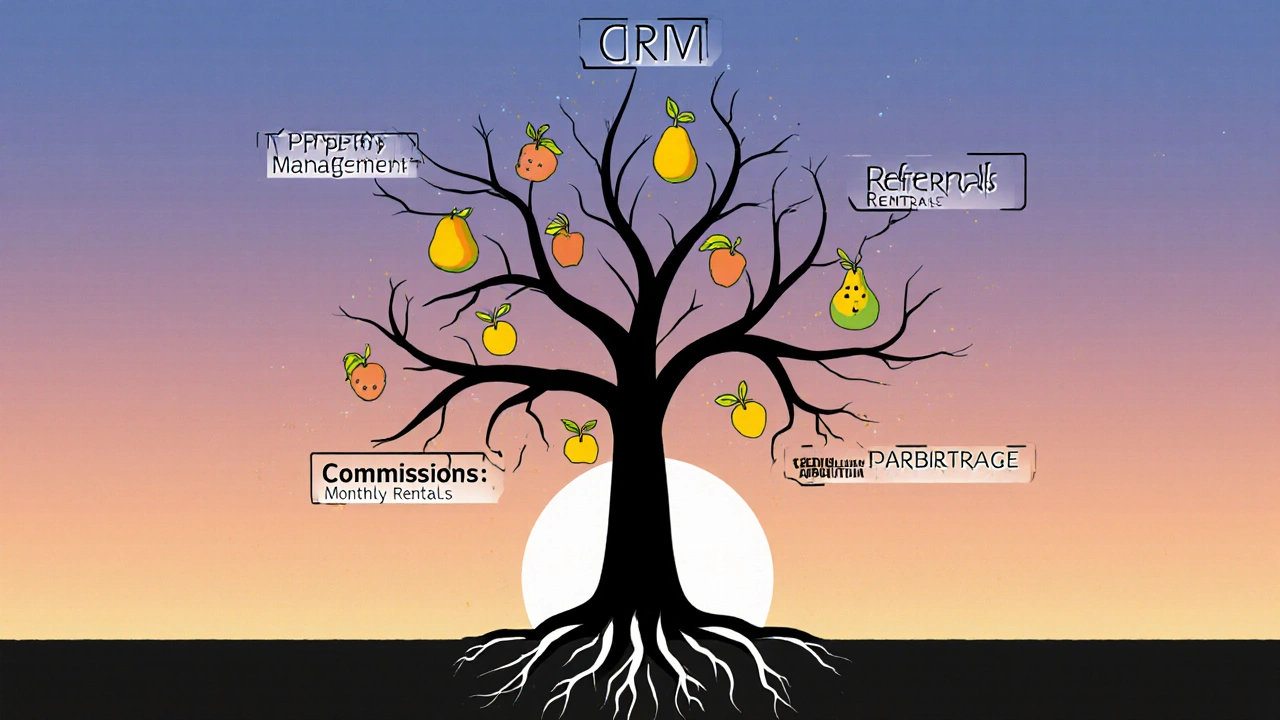Starting a real estate business isn’t about buying your first house and flipping it. It’s about building a system that works while you sleep. In 2025, the real estate business is more competitive than ever-but also more accessible. You don’t need millions in capital or a fancy degree. You just need the right strategy, a few key relationships, and the discipline to follow through.
Know Your Niche Before You Buy a Single Property
Too many new agents jump into real estate thinking they’ll sell everything. That’s how you burn out. The most successful real estate businesses focus on one thing and do it well. Are you selling first-time homes in suburban neighborhoods? Are you leasing commercial spaces to small businesses? Are you managing short-term rentals in tourist-heavy areas?
Each niche has different rules. Selling luxury condos in downtown Chicago requires different marketing, pricing, and client communication than managing 20 single-family rentals in Phoenix. Pick one. Master it. Then expand.
For example, in 2024, data from the National Association of Realtors showed that 68% of top-performing agents specialized in one property type. Those who tried to be everything to everyone earned 40% less on average.
Build Your Pipeline, Not Just Your Listings
A real estate business doesn’t run on listings. It runs on leads. And leads don’t come from Zillow ads alone. The most consistent income comes from people who already know you, trust you, and think of you first.
Start with your sphere: friends, family, coworkers, past clients. Send them a simple monthly email-not a sales pitch, but a local market update. Include one photo of a home that just sold nearby, the average days on market, and a quick note: “Thought you’d find this interesting.”
After 3 months, you’ll start getting calls. Not because you asked. Because you showed up.
Then add local networking. Join the Chamber of Commerce. Attend neighborhood association meetings. Offer to give a free 15-minute workshop on “How to Sell Your Home Without Getting Lowballed.” You’re not selling. You’re helping. That’s how trust builds.
Technology Is Your Co-Worker, Not Your Replacement
You don’t need to be a tech expert. But you do need to use the right tools-and use them consistently.
Here’s what works in 2025:
- CRM software like LionDesk or Follow Up Boss to track every lead, every interaction, every follow-up date.
- Automated email sequences that send value-based content without you typing a single word.
- Virtual tour platforms like Matterport that let buyers walk through homes from their couch.
- AI-powered listing descriptions that write compelling, SEO-optimized property blurbs in seconds.
But here’s the catch: technology doesn’t replace relationships. It enhances them. A client who gets a personalized video tour from you, followed by a handwritten note, will remember you long after the closing.

Money Comes From Systems, Not Single Deals
One house sale might earn you $15,000. But a property management business with 50 units can earn you $20,000 a month-passively.
That’s why the most profitable real estate businesses don’t stop at sales. They layer in income streams:
- Property management (10% of monthly rent)
- Home warranty partnerships (commission on every policy sold)
- Referral networks with mortgage brokers, inspectors, contractors
- Rental arbitrage (leasing apartments and subletting as short-term rentals)
You don’t need to do all of these at once. Start with one. Get it running smoothly. Then add another.
For example, an agent in Austin built a portfolio of 12 rental homes over three years. She hired a part-time property manager at $500/month. Her net income from rentals? $8,200/month. Her commission income from sales? $3,500/month. She now works three days a week.
Legal and Financial Basics You Can’t Ignore
You can skip the fancy car. You can skip the office. But you can’t skip the basics.
First, get licensed. Every state requires a real estate license to legally represent buyers or sellers. Costs range from $500 to $1,500 depending on your state. Study materials are often free through your local association.
Second, set up an LLC. This isn’t just for tax reasons-it protects your personal assets. If a client sues you over a missed disclosure, your personal savings stay safe.
Third, separate your finances. Open a business bank account. Use accounting software like QuickBooks or Wave. Track every dollar in and out. You’ll thank yourself at tax time.
And don’t forget insurance. Errors and omissions (E&O) insurance costs about $500-$1,000 a year. It’s cheap compared to a single lawsuit.

What Most People Get Wrong About Real Estate
The biggest myth? That you need to be a “people person.”
You don’t. You need to be consistent. You need to be reliable. You need to show up on time, answer emails promptly, and deliver what you promise.
Another myth: You need to work 80-hour weeks to succeed. In reality, the top earners in real estate work 30-40 hours a week. They just work smarter. They automate the boring stuff. They outsource the tasks they hate. They focus only on what moves the needle.
And here’s the truth most agents won’t tell you: You don’t need to be the loudest in the room. You just need to be the most prepared.
Start Small. Think Long-Term.
Don’t wait for the perfect moment. There isn’t one. The market won’t wait for you to feel ready. But you can start today-with one phone call, one email, one open house.
Here’s your 30-day action plan:
- Choose your niche (e.g., first-time buyers in your city).
- Get your real estate license (if you don’t have it).
- Set up a simple CRM with your top 20 contacts.
- Send your first market update email.
- Attend one local networking event.
- Open a business bank account.
- Buy a domain name and build a basic website with your photo, niche, and contact info.
That’s it. No grand launch. No expensive ads. Just steady, focused action.
Real estate isn’t a get-rich-quick scheme. It’s a get-rich-slowly-and-steadily business. The people who win aren’t the flashiest. They’re the ones who show up every day-even when no one’s watching.
Do I need a college degree to start a real estate business?
No. A college degree is not required to become a real estate agent or start a real estate business. All you need is a state-issued license, which requires completing a pre-licensing course (usually 60-120 hours) and passing an exam. Many successful agents have no formal education beyond high school. What matters is your ability to learn the market, build trust, and follow through.
How much money do I need to start a real estate business?
You can start with under $2,000. That covers your licensing fees, background checks, MLS access, and basic marketing tools. If you’re planning to buy property, you’ll need more-typically 20% down for investment homes. But you don’t need to buy property to build a real estate business. Many agents start by helping others buy and sell, earning commissions without spending their own money.
Can I run a real estate business part-time?
Yes. In fact, over 40% of new agents start part-time while keeping their current job. Many use evenings and weekends to build their client list. It takes 6-12 months to build steady income, but part-time work lets you test the waters without financial risk. Once you’re earning more than your current job, you can transition fully.
What’s the difference between a real estate agent and a broker?
A real estate agent works under a broker’s license. A broker has passed additional exams and can work independently, hire agents, and own a brokerage. Most agents start as agents, then become brokers after gaining experience-usually 2-3 years. You don’t need to be a broker to make good money, but becoming one opens up higher income potential through team commissions and brokerage fees.
Is real estate still profitable in 2025?
Yes, but it’s different than it was 10 years ago. Interest rates are higher, inventory is tighter in many markets, and buyers are more cautious. But demand hasn’t disappeared-it’s just shifted. Urban cores are seeing renewed interest from remote workers. Suburbs still have strong demand from families. And rental demand is at record highs nationwide. The profitable agents in 2025 are those who adapt to local conditions and focus on service, not just transactions.
What Comes Next?
If you’re serious about building a real estate business, your next step isn’t buying a website template or signing up for a “millionaire mentor” course. It’s picking one small action and doing it today.
Call a friend who just bought a home. Ask if they’d be open to a quick coffee chat. Send a text to your cousin who’s thinking of selling their condo. Visit your local Realtor association’s next meeting.
Real estate rewards action-not planning. The best time to start was yesterday. The second-best time is now.

8 Responses
Really solid breakdown. I’ve been in this for 5 years and the niche advice alone saved me from burning out. Focused on first-time buyers in suburban Chicago - turned a $3k investment into a full-time income without ever buying a property myself.
you know what’s wild? the people who think they need a degree or a million dollars are the same ones who never start. real estate doesn’t care how fancy your resume is. it only cares if you show up.
meh. everyone says this. but good luck finding clients when every other agent is spamming facebook ads with the exact same script.
Okay, let’s be real - the ‘send a monthly email’ thing? That’s not strategy, that’s basic hygiene. And ‘handwritten notes’? Cute. But if you’re not using AI to auto-segment your leads and trigger hyper-localized video messages, you’re already behind. Also - why is no one talking about the fact that Zillow’s lead prices are up 200% since last year? You’re gonna need to spend more on ads just to break even.
Let’s unpack this. The article claims you can start with under $2,000. That’s technically true - but only if you ignore the hidden costs: MLS access ($400/month), E&O insurance ($800/year), CRM subscriptions ($100/month), and the 10-15 hours per week you’ll lose chasing unqualified leads. The real cost isn’t money - it’s time. And most people don’t have 200 hours to burn before they see a dime. Also - ‘property management’? Unless you’re in a hot rental market like Austin or Nashville, vacancy rates are spiking. You’re not building passive income - you’re building a part-time job with liability.
Bro, this is gold. I’m from India, started part-time last year. Used the CRM + email sequence thing - got my first client from a text to my cousin. Now I’m doing 3 deals a month. No degree. No money. Just consistency. You don’t need to be loud. You just need to be reliable. This post nailed it.
Tom, you’re right about the hidden costs - but you’re missing the point. The article isn’t about scaling to a brokerage. It’s about starting. And if you can’t afford the tools yet, you start with free ones: Google Sheets, WhatsApp, and a handwritten note. The systems come later. The first step is showing up - not optimizing.
Actually, I’ve been doing this for 8 years. The only thing that matters? Referrals. Not CRM. Not AI. Not even your niche. If your clients don’t refer you, you’re dead. And if you’re not asking for referrals after every closing - you’re leaving money on the table. Just say it. ‘Hey, if you know anyone else thinking of moving, I’d love an intro.’ That’s it. No fluff.